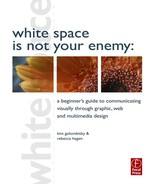preface
This book is for the “beginning” visual communicator. Whether you’re already a media pro or hoping to be one soon, we assume our book is your introduction to graphic design and layout. We also assume you’re busy. So we try to cover the basics quickly without being too boring.
OUR BIG IDEA
Our humble little book can’t be everything to everyone. But we did plan it to combine some things typically treated separately:
1. News, PR, advertising & marketing communications:
We address different communications careers together as if they actually interact in the real world. Today’s communications professionals all have to be visual, even the writers. And visual foundations are the same for all beginners. At the same time, where differences between journalism and the strategic communication arts remain sacred, we honor them.
2. Electronic & print media:
We embrace design for new and traditional media since the former is here to stay and the latter isn’t going away. Because communications professionals need to be ambidextrous with both, we attend to visual practices across platforms and formats.
3. Visual communication, design & layout:
We integrate three traditionally segregated approaches: visual communication, graphic design and layout. Beginners need elementary how- to rules (layout). But without thinking about the rules as functional messaging (visual communication) and without developing a good eye (design), the rules remain rote ideas either soon forgotten or ploddingly applied without creativity or innovation.
The book relies on three themes that chapters return to again and again in order to reinforce concepts and practices:
1. Effective graphic design does four things: It captures attention, controls eye movement, conveys information and evokes emotion.
2. All design uses three building blocks: visuals, type and negative space.
3. Beginners need to learn the conventional rules first before earning the right to break said rules.
TONE, DICTION & STYLE
White Space is intentionally light-hearted and conversational. We employ an informal tone and diction to avoid reading like a traditional textbook. Most people find textbooks unappealing. Our students don’t bother to read them.
Our goal has been to make White Space a fast, effortless read. We present information in a down-to-earth fashion without talking down to anyone. We use humor to avoid taking the book’s content or ourselves too seriously.
Given the book’s applied emphasis, we use the Associated Press as our style guide—except where we take creative license.
CHAPTER PREVIEWS
Although each chapter flows from the previous one and segues to the next, by design the chapters also make sense read out of order or standing alone. We envision White Space useful as either a primary text or a supplemental resource. We also see it complementing media writing and editing courses.
Chapters 1–4 represent a book within a book. By the end of Chapter 4, the casual and impatient reader can opt out with dramatically improved skills.
♦ Chapter 1 answers the beginning student’s perennial question: “What is design?”
♦ Chapter 2 reminds new designers to “step away from the computer for” the predesign work of “research & brainstorming.”
♦ Chapter 3 covers the “works-every-time layout,” which allows us to describe Western layout in its most universal form while also teaching introductory rules for working with visuals, type and negative space.
♦ Chapter 4 pre-empts the most common visual, type and composition “layout sins” in a checklist of “13 amateur errors.”
After Chapter 4, readers have enough elementary skill to begin executing assignments, whether for the classroom or the office. So chapters 5–7 shore up some foundational details:
♦ Chapter 5 sends readers to “mini art school” to learn the “elements & principles of design” that develop the good eye.
♦ Chapter 6 explains “grids” as the skeletal structure organizing visual communication in complex and multiple-screen/page designs.
♦ Chapter 7 then fills in the blanks on “layout” format and composition from aspect ratio and focal point to visual hierarchy and modular design—along with goodies such as the golden proportion and Gestalt theory.
Next, readers can drill down on more advanced rules for type, color and visuals:
♦ Chapter 8 expands the rules and uses of “type” from text-heavy formats and projects to creative type as art.
♦ Chapter 9 deals with “choosing & using color,” including sources of color inspiration as well as color as culture, science and technology.
♦ Chapter 10 spells out technique, technology and ethics of designing with “photos & illustrations.”
Remaining chapters touch on more complex design work:
♦ Chapter 11 serves up a quickie lesson on “infographics” as “maximum information in minimum space.”
♦ Chapter 12 describes elementary concepts for “storyboarding 101: planning visual storytelling” for moving pictures, such as video, film and animation.
♦ Chapter 13 moves on to planning visual communication as “multimedia components,” including slideshows, video and audio clips, animation and interactivity.
♦ Chapter 14 introduces visual communication issues in “designing for the Web” from fonts and colors behaving badly to navigating intuitively and getting GUI.
♦ Chapter 15 details mechanical printing from papers, folding and binding to working with commercial printers.
♦ Chapter 16 wraps things up with a few words of encouragement before saying, “thanks for stopping by.”
Each chapter concludes with exercises thinly disguised as “Try This.” You’ll find a glossary at the back of the book.
We also invite readers to visit the companion Web site for this book: www.whitespacedesignbook.com.
The how-to’s of design and layout as visual communication are the same regardless of career track. We planned White Space Is Not Your Enemy as a comprehensive introduction for any communications major, track or sequence, across traditional and new media formats: one concise and practical source surveying the fundamentals for any platform for anybody.
